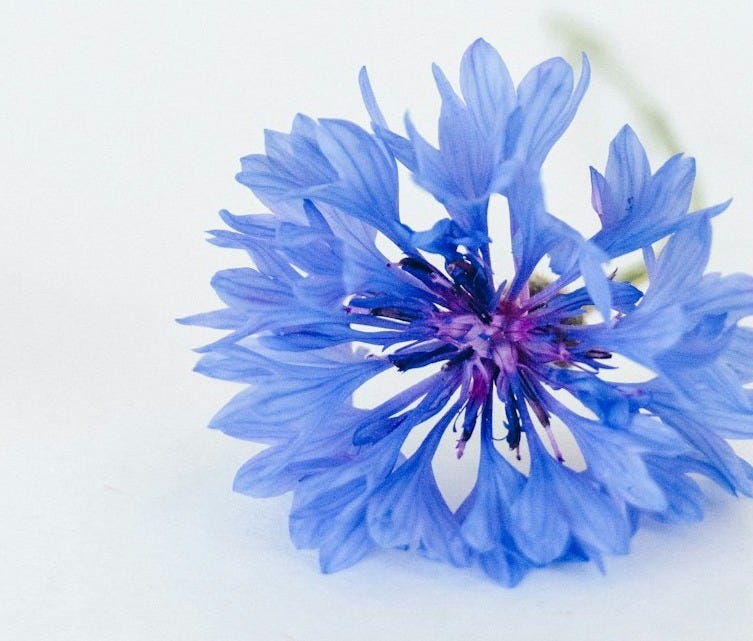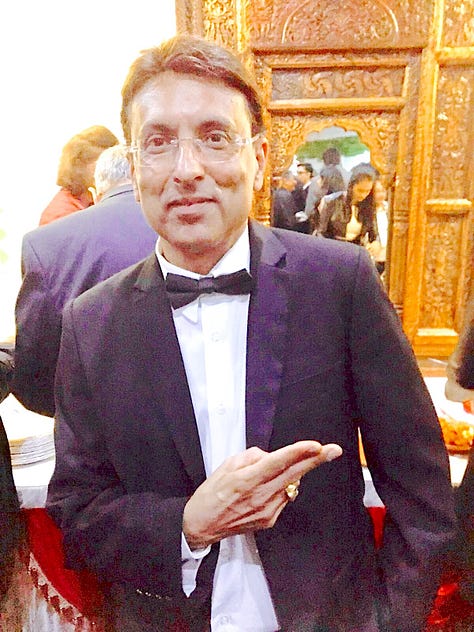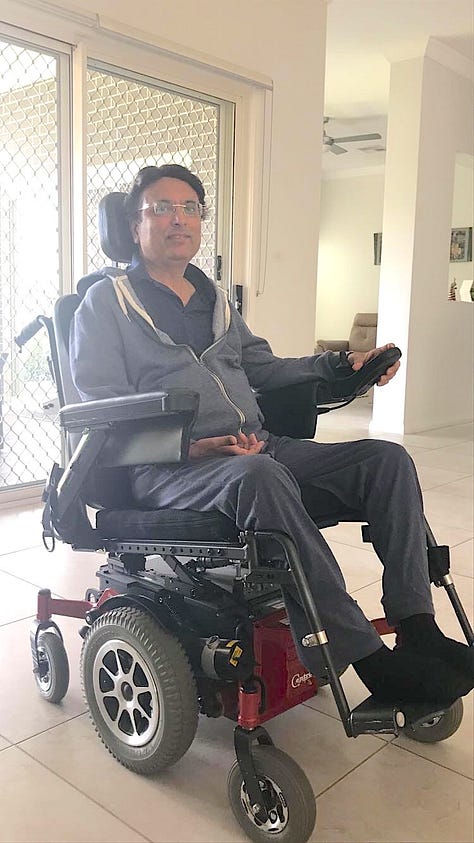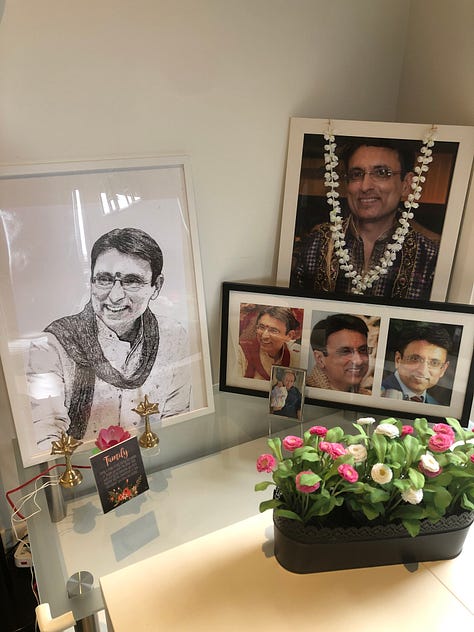#22 A 2-minute challenge to give you a glimpse into the disease that took my dad, in honour of Rare Disease Day
Plus SIX things I wish everyone knew about ALS and why it matters (point 5 is eye-opening!)

I have a challenge for you. Put on a timer for two minutes, and sit absolutely still.
Don’t move a muscle. You can’t shake out that restless leg. Can’t scratch that itch. Don’t even think about swallowing that saliva building up in the back of your throat.
When the time is up, reflect on this question:
How many times did you feel the urge to move in just two minutes?
Now imagine you had to live like this every minute of every day until the day you die. For weeks and months, maybe a few years if you’re “lucky”. Imagine if you could never again hug a loved one, enjoy your favourite meal, scratch an uncontrollable itch, call out for help, or even just catch your breath.
This is the reality of having motor neurone disease (MND) or amyotrophic lateral sclerosis (ALS). This was the reality my Dad faced before he lost his life to this condition six years ago.
Yet, despite being considered in the medical world to be one of the most devastating diseases to exist, ALS/MND is often overlooked, widely misunderstood and seriously underfunded.
In today’s newsletter, I share six crucial things I believe everyone should know about the disease that took my dad’s life, and why raising awareness is so important — not just to me and those of us who have been personally affected by the disease, but for EVERYONE.
[NOTE: From now on, I will refer to the disease as “ALS/MND” for brevity.]
I’d love to hear from you! When you’re done reading, click the comment button and let me know:
Have you or someone you know been impacted by a rare disease? How did it change your perspective — on health, caregiving, awareness, or life in general?
What do you think is the biggest misconception about ALS/MND, and how can we change it?
This piece is adapted from an article I wrote last month, published in Independent Australia. It’s my first-ever published piece which is exciting! I hope Dad would be proud.
Hi there, I’m Ruhie! A writer, doctor, mum of three & a daughter who lost her dad to terminal illness.

Dear Dad,
Last Friday 28th February was Rare Disease Day — a day to honour the lives of people affected and raise much-needed awareness. But for those of us who have been personally affected by rare diseases, it is a timely reminder that the fight for awareness can’t just be a one day thing. It needs to be loud, widespread and ongoing.
As someone who has both learnt about ALS/MND as a doctor and witnessed its devastating impact firsthand, I can’t help but think about how little people truly know about it. Many are familiar with the Ice Bucket Challenge, which went viral in 2014 (can you believe that was ten years ago?) But how many people know what that money was supporting?
The sad reality is that, despite being considered by medical professionals as one of the cruellest diseases to exist, ALS/MND is widely misunderstood and grossly underfunded. Recently, we did have a step in the right direction in Australia when football legend and MND advocate Neale Daniher was named Australian of the Year. This (temporarily) brought more attention to the disease. But the fact of the matter remains that ALS/MND is a terminal illness with no cure, and the funding and research needed for life-changing breakthroughs are nowhere near where they should be.
But, the more we talk about it, the more we can spark the change that’s so desperately needed. So, in honour of Rare Disease Day, here are SIX things I think everyone should know about ALS/MND — because awareness is the first step toward finding a cure and bringing hope to those affected.
1. It is brutal
While people may have heard of MND, many are unaware of the horror it wreaks on those it affects.
MND is a progressive neurodegenerative disease where the motor neurones in the brain and spinal cord degenerate over time. This causes the muscles they supply to weaken and waste away. People progressively lose the ability to walk, talk, swallow and eventually breathe.
They end up completely paralysed, confined to a wheelchair, entirely dependent on others, fed through a tube from their abdomen directly into the stomach, reliant on a ventilator to breathe overnight and barely able to speak.
While it robs them of all movement, their senses and mental functioning remain fully intact — so they are acutely aware of what is happening to them, but unable to do anything about it.
I watched you lose yourself bit by bit every day for three years. It is a cruel fate.
And at the end of it all?
2. It kills everyone it affects
No one survives ALS/MND. While the rate of progression varies from person to person, it is universally fatal from the moment someone is diagnosed.
About 50% of people die within thirty months of symptom onset — less than three years. Only 10% of those affected may survive a decade or more — people like world-renowned theoretical physicist, the late Professor Stephen Hawking, who somehow lived fifty-five years with ALS. Unfortunately, these cases are exceedingly rare. For most, the prognosis is far more grim.
Average life expectancy after diagnosis is just two to five years. You were smack bang in the middle of that – three years, three months, and twelve days (yes, I counted).



3. There is no cure
Despite the unwavering efforts of researchers and medical teams around the world, no cure has been found for ALS/MND. There are very few treatment options and they have minimal effect on slowing progression or prolonging life.
4. It is not as uncommon as we think
Every day, two people are diagnosed with ALS/MND and two people die from it.
While it is traditionally considered “uncommon” in terms of prevalence (the number of people living with it at any given time), that’s only because of its incredibly high mortality rate — with so many people dying from the disease, the number of people living with it remains low.
However, the lifetime risk is one in 300! That means one out of every three-hundred people will get ALS/MND across the span of their whole life — which is MUCH higher than most people realise.
5. It can strike anyone, anytime.
MND does not discriminate. It can happen to anyone regardless of age, gender, ethnicity, or pre-existing health. And despite decades of research, the exact cause is still unknown — meaning no one is safe from getting it.
6. More awareness is desperately needed.
Clearly, there is still so much we don’t know about this harrowing disease. While campaigns like the Ice Bucket Challenge have been instrumental in raising funds for MND research, they’re not nearly enough given the enormous cost and impact of the disease.
MND/ALS awareness can’t just be a passing fad – something people hear about once a year and then forget.
Because those of us who have seen it, lived through it, lost loved ones to it, will never forget.
Because no one can be complacent or assume it’s not their problem. It wasn’t ours either until you were diagnosed. It can affect anyone.
Because greater awareness may lead to increased funding for research, which is our only hope of finding a cure.
Because no one deserves to suffer what you went through.
So, I’ve made it my mission to talk about it. To be a voice for this underrepresented community. I remember when you were first diagnosed, we thought, hoped, prayed, for a miracle — that maybe a new treatment or cure would come out before it was too late.
It didn’t happen in your lifetime, Dad, but I hold out hope that it will happen for others. I live for the day when a cure is finally found and the world is rid of MND/ALS for good.
I know when that day comes, you’ll be celebrating, wherever you are.
Miss you every day, Dad. Love you always. Until next time 💌
Ruhie
If you stuck it out until the end of this piece, thank you! From the bottom of my heart, I truly appreciate you taking the time and effort to read something so close to my heart.
I’d love to hear from you! Click the comment button below and let me know:
Have you or someone you know been impacted by a rare disease? How did it change your perspective — on health, caregiving, awareness or life in general?
What do you think is the biggest misconception about ALS, and how can we change it?
Thanks so much for being here! If you got value from this and you think others might too, please:
Click the HEART button 💟 and leave me a COMMENT 💬
SUBSCRIBE for free to “From the Heart to Beyond”
SHARE my newsletter with someone you think would enjoy it
And don’t forget to
🌈 Live Fully
💛 Love Deeply
😁 Laugh Often
⏳ Make the most of the time we are given








Thank you Ruhie for raising awareness about Motor Neurone Disease (MND) through personal experiences, especially the loss of a loved one, is both courageous and deeply impactful. Turning the pain of loss into a mission to educate and inspire others is a beautiful way to honor your Dad’s memory. By sharing his story, you are not only keeping his legacy alive but also bringing much-needed attention to the urgent need for research, support, and, ultimately, a cure for MND. Your efforts will undoubtedly make a difference in the lives of many facing this devastating disease.
Sending love and strength your way—your Dad would be so proud of the way you're carrying his light forward. He was a great inspiring soul and dear friend to many people within community and loved ones. Thanks again for keeping his legacy alive. Mahesh Uncle and Ila Aunty
Thank you for your very informative article & a heartbreaking one too. I first encountered this cruel disease when a young dad asked to see me. I used to be a primary school principal. He told me his wife & mother of three young children aged 4, 6 and 8 had been diagnosed with motor neurone disease. This beautiful woman died only 14 months later. It was so tragic to watch how she lost her abilities in speech and movement. We desperately need more research to bring forward a cure. My deepest sympathy to you on your father’s death. Helen OToole